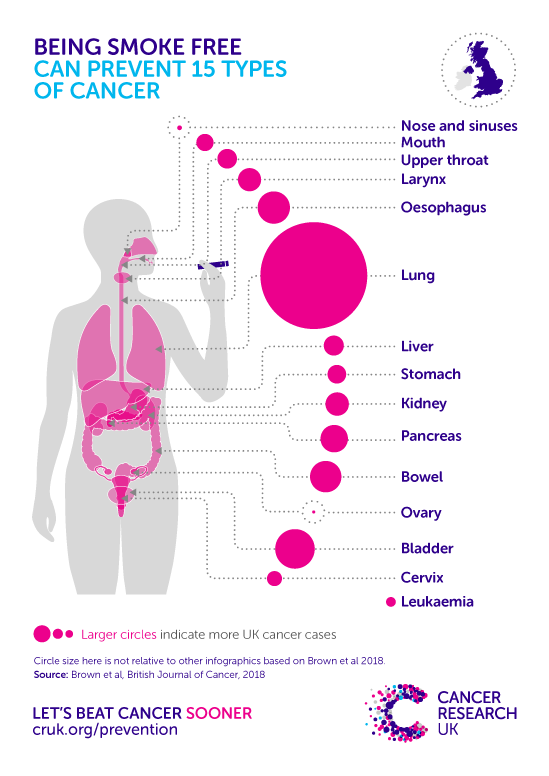How smoking causes cancer
Smoking is by far the biggest preventable cause of cancer. Thanks to years of research, the links between smoking and cancer are now very clear. Smoking accounts for more than 1 in 4 UK cancer deaths, and 3 in 20 cancer cases.
The good news is that many of these deaths are preventable, by giving up smoking. Speak to your GP or pharmacist, or visit the NHS Smokefree pages for free advice and support to give you the best possible chance of quitting.
Which cancers are caused by smoking?
Chemicals in cigarette smoke enter our blood stream and can then affect the entire body. This is why smoking causes so many diseases, including at least 15 types of cancer, heart disease and various lung diseases.

Smoking causes around 7 in 10 lung cancer cases in the UK. Lung cancer survival is one of the lowest of all cancers, and is the most common cause of cancer death in the UK.
Smoking also increases the risk of at least 14 other cancers including cancers of the mouth, pharynx (upper throat), nose and sinuses, larynx (voice box), oesophagus (gullet or food pipe), liver, pancreas, stomach, kidney, bowel, ovary, bladder, cervix, and some types of leukaemia Smoking could increase the risk of breast cancer, but any increase in risk is likely to be small.
More information about different cancer types.
What influences the risk of cancer from smoking?
Smokers have a much higher risk of lung cancer than non-smokers, whatever type of cigarette they smoke. There’s no such thing as a safe way to use tobacco.
Filters and low-tar cigarettes make little difference – your lung cancer risk is not lower compared to smokers of average cigarettes. This may be because smokers tend to change the way they smoke in order to satisfy their nicotine craving, for example by taking bigger puffs or smoking more cigarettes.
The more cigarettes you smoke a day, the higher your risk of cancer. If you aren’t able to quit completely, cutting down the number of cigarettes you smoke a day can be a good first step. Even light or social smoking can harm your health so keep trying to stop entirely.
Scientists have found that the number of years you spend smoking affects your cancer risk even more strongly than the number of cigarettes you smoke a day. For example, smoking one pack a day for 40 years is even more dangerous than smoking two packs a day for 20 years.
The serious damaging effects of smoking cannot be cancelled out by leading an otherwise healthy lifestyle, like keeping fit and eating healthily. The best way to reduce your risk is to give up smoking completely.
How does smoking cause cancer?
The main way that smoking causes cancer is by damaging our DNA, including key genes that protect us against cancer. Many of the chemicals found in cigarettes have been shown to cause DNA damage, including benzene, polonium-210, benzo(a)pyrene and nitrosamines.
This is already bad news, but it’s made worse by other chemicals in cigarettes. For example chromium makes poisons like benzo(a)pyrene stick more strongly to DNA, increasing the chances of serious damage. And chemicals like arsenic and nickel interfere with pathways for repairing damaged DNA. This makes it even more likely that damaged cells will eventually turn cancerous.
Smokers are also less able to handle toxic chemicals than those with healthy lungs and blood. Chemicals in cigarette smoke make it harder for smokers to neutralise or remove toxins, and can make their immune systems less effective too.
How long does it take for smoking to cause cancer?
It usually takes many years, or decades, for the DNA damage from smoking to cause cancer. Our bodies are designed to deal with a bit of damage but it’s hard for the body to cope with the number of harmful chemicals in tobacco smoke. Each cigarette can damage DNA in many lung cells, but it is the build up of damage in the same cell that can lead to cancer. However research has shown that for every 15 cigarettes smoked there is a DNA change which could cause a cell to become cancerous. This is why it’s better to give up smoking sooner rather than later.
| Chinese Association on Tobacco Control Copyright © 1992-2011 906-907 Anhuidongli, Chaoyang District Beijing 100101 |